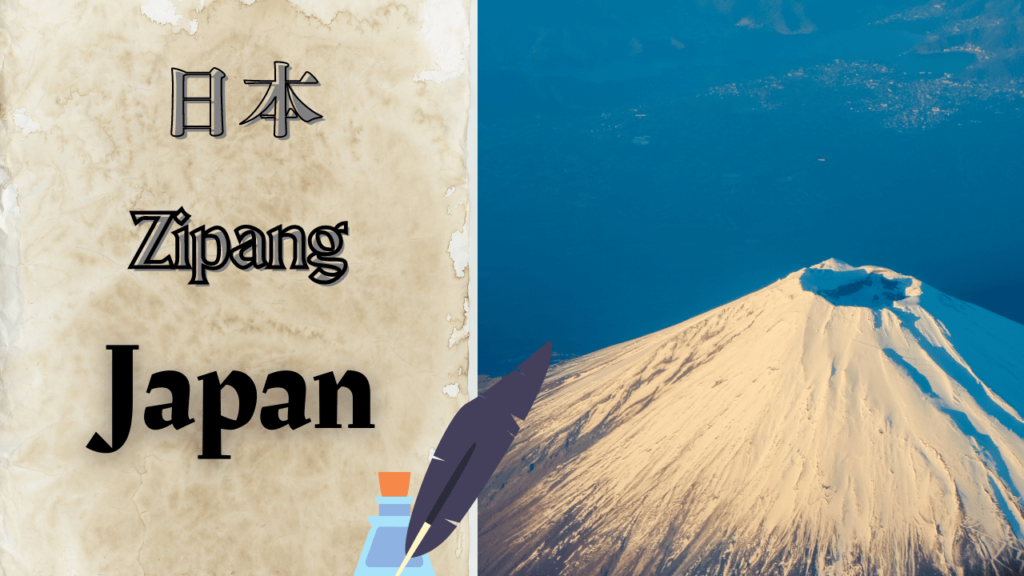[ad_1]
The People of ‘Wa’
Although the Kojiki is the earliest known document of written Japanese, the earliest reference to Japan as a country comes from Chinese historical texts and court documents penned hundreds of years earlier in a history book of the Later Han Dynasty (25-220). In these documents, Japan was referred to as ‘Wa (倭)’, a name that likely came from the first Chinese envoys they encountered. [6][9]
Several theories exist for the usage of ‘Wa’. One theory suggests it comes from the traditional Japanese words for ‘I’ and ‘we’ (‘waga/我が’and ‘ware/我’). The Chinese envoys probably thought ‘Wa’ was what the people of Japan called themselves: the ‘Wa’, or the people of ‘Wa’. In accordance with this, they referred to Japan as ‘Wakoku (倭国)’, or the ‘Land of Wa’. [2]

This was the first time another nation recognized Japan as a country. However, at this time, Japan itself consisted of several provinces, rather than being one individual country. The most prominent was the Yamato (current Nara region). Several theories exist about the origin of the name ‘Yamato’. One suggests it came from the meaning ‘mountain gate’, as the area was surrounded by mountains. This word also came to represent Japan and traditionally Japanese things over time. [7]
The Yamato people adopted the ‘Wa (倭)’ character to write their own name during the Kofun Period (250-538). However, rather than use the original on’yomi reading, ‘wa’, they attached their own name to it, giving 倭 the kun’yomi reading, ‘yamato’. At first, Yamato was written simply as 倭 (Wa). But during the Asuka Period (538-710), Japanese underwent another change, standardizing most place names into two-character compounds. Following suit, the Yamato people affixed the character for ‘great (大)’ as a prefix, resulting in a new spelling of Yamato, 大倭, which remained throughout the Asuka Period. [1][2]
A Country By Any Other Name?
Around the 7th century, Japanese underwent another change, this time being to the name they called themselves. The Yamato people came to understand that the original kanji, 倭, had some undesirable connotations, including subservient, kneeling, and dwarf. [1]
They decided to switch to a different ‘wa’, opting for the kanji we recognize today, 和, a homonym meaning ‘peace/harmony’. In accordance with the change, the new spelling for Yamato became 大和 (literally, ‘great harmony’). This is the same ‘wa’ you’ll see frequently nowadays in reference to traditional Japanese things, including washoku (和食/Japanese food), wagyu (和牛/Japanese beef), and washitsu (和室/Japanese-style room). [2][9]

The Etymology of Japan as ‘Nihon’ (日本)
Japan continued to go by 大和/Yamato until around 700CE, when another name change took place: 日本 (Nihon/Nippon). The earliest record of 日本 appears in the Old Book of Tang, a collection of historical Chinese records from the Tang Dynasty.
This name came from Prince Shotoku Taishi, who famously addressed himself as the ‘Emperor of the Land of the Rising Sun’ (日出ずる国/’hi izuru kuni’) to the Emperor of China’s Sui Dynasty, in reference to Japan’s geographical position to the east of China. 日本 was an abbreviation of the expression 日が出てくる本 (hi ga dete-kuru moto), or ‘the place from which the sun rises’. The kanji compound ‘日本’ literally means ‘origin of the sun’, in which 日 (nichi/hi) means ‘sun/day’ and 本 (‘hon‘) means ‘base/origin’. [3]
The switch from 大和 to 日本 took place gradually throughout the Heian Period, with the Yamato people continuing to use the ‘yamato’ reading with the new spelling. It’s unclear exactly when Japan settled on ‘日本/nihon’ as the official spelling and pronunciation, but it began as ‘nippon’, which was closer to the original Chinese reading.
But even this pronunciation evolved in accordance with the phonological shifts of Early Modern Japanese, going from ‘nifon’ to its current reading, ‘nihon’. (For the linguists, the shift in question is that of the Japanese f/h, which began as [p], eventually softening into [ɸ] until settling on the [h] sound of today). [3]
Nihon or Nippon?
Somewhere along the lines, the pronunciation of 日本 became a subject of debate. Was it ‘Nihon’ or ‘Nippon’? One theory states that the latter pronunciation also came from Chinese diplomats, who pronounced the characters as ‘nyet pan’ (ニエット・プァン). And although the Japanese government made several attempts to determine an official reading, they ultimately rejected the movement, declaring both to be correct. However, you’ll see ‘nippon’ more often in official/formal settings. [3]
(Read more about the difference between ‘nihon’ and ‘nippon’ HERE!)
The Etymology of Japan in English
Now we know where Japan’s name for itself came from. However, ‘Nihon’ is still quite different from what people in the Western world call it: ‘Japan’. How did this happen? Let’s look at the etymology of Japan, in English!
The English word ‘Japan’ is an exonym, a name given to an ethnic group or geographical entity by a different ethnic group. This means that the name ‘Japan’ did not come from Japan itself. Rather it came to the West from early trade routes. Linguists believe it derives in part from Marco Polo’s interpretation of the Chinese name (‘Cipan’ or ‘Zeppen’). Since Polo never actually visited Japan himself nor interacted with its people, all his knowledge of Japan came indirectly through the countries of mainland Asia. [2][6]
The modern Shanghainese pronunciation of 日本 is ‘Zeppen’, while northern China used ‘Cipan’, and southern China used ‘Yatbun/Yatpun’. Polo introduced Japan to Europe as ‘Cipangu/Zipangu’, which modern Japanese transliterates as チパング/ジパング, and English transliterates as any of the following: Chipangu, Jipangu, Zipangu, Jipang, or Zipang. Many variations of ‘Japan’ in other Western languages show a clear similarity, as well (such as Japan, Japon, Giappone, Yaponiya, etc). [3][9]
‘Zipangu’, Land of Gold
In his book, ‘The Travels of Marco Polo’, Polo writes that “Zipangu was an independent island country… It produced a large quantity of gold, so that palaces and private houses were made in gold, being abundant in treasure”. Polo’s book spread word through Europe about ‘Zipangu, land of gold’ throughout the 13th century (although the nickname ‘land of gold’ may have been an exaggeration). [4]
However, Portuguese missionaries wouldn’t reach Japan until the end of the 16th century. At this time, they encountered the Malay and Indonesian words Jepang, Jipang, and Jepun, which also derive from Chinese dialects. Through these traders, and the use of Polo’s book as a reference, variations of ‘Zipangu’ soon spread throughout Europe, shifting spelling and pronunciation in accordance with the native language of each country.
Japan appeared for the first time on a European map as Cipangu in 1457, and was first recorded in English in 1577 as Giapan. [3][9]
A Long , Strange Etymological Journey
So, a long linguistic journey was taken to arrive at the name so many of us now know this archipelago nation by. These days, while Nihon/Nippon remains the local endonym, “Japan” is quite popular within the country itself. When the country looks inward, it’s “Nihon” – when it reflects on its place on the world stage, it’s often “Japan/ジャパン.” Look no further than “Samurai Japan” (侍ジャパン), the official nickname of the Japanese national baseball team, or “Cool Japan” (クールジャパン), the somewhat ill-fated Japanese government policy of promoting its culture abroad.
Japan is far from the only country with a widespread exonym that’s radically different from its own endonym; China got the ball rolling on calling Japan something very different from what Japan called itself, but it also suffers the same fate: “China” is quite different from what that country calls itself, “Zhōngguó.”
Like all identities, there’s the inward vision of oneself and how one is perceived by others. Nihon thinks of itself mainly as Nihon, but to much of the rest of the world, it’s truly Japan.
Resources
[1] How to Say Japan in Different Languages. In Different Languages
[2] Where Does Japan’s Name Come From? Culture Trip
[3] Names of Japan. Wikipedia
[4] ジパング (Zipangu). Japanese Wiki Corpus
[5] “じっぽん”と読まれていたことも…日本はどうして国際的な場面で「Japan」と呼ばれるようになったの?. Livedoor News
[6] 日本はなぜJapan?ジャパンの語源・由来とは?いつから国号「日本」なの?日本の起源は神話? Learn Japanese
[7] 大和 (Yamato). Japanese Wiki Corpus
[8] 大和. Wiktionary
[9] Etymology of ‘Wa’, ‘Yamatai’ and ‘Nippon’. Heritage of Japan
[ad_2]
Source link



